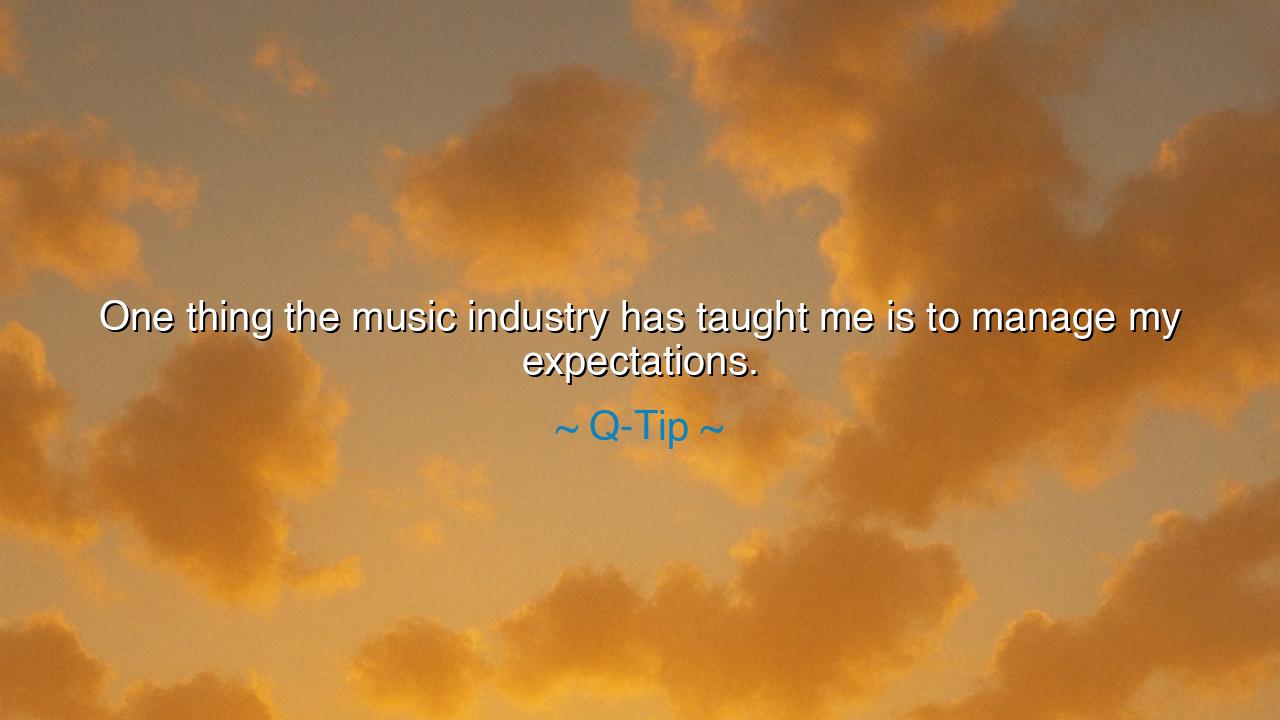
One thing the music industry has taught me is to manage my






“One thing the music industry has taught me is to manage my expectations.” Thus spoke Q-Tip, poet of rhythm and voice of a generation, whose words echo not only the lessons of art but the trials of life itself. For in his reflection lies an ancient truth: that much sorrow is born not from failure itself, but from the weight of expectations unmet. To learn to temper desire, to balance hope with patience, and to root joy in effort rather than outcome—this is wisdom as old as time.
The ancients would have said: “Blessed is he who hopes, yet is not enslaved by hope.” For when the heart clings too tightly to expectation, disappointment can break it like a fragile vessel. Q-Tip, tested in the fires of the music industry, discovered that the path of an artist is not paved only with triumph, but with betrayals, delays, broken promises, and shifting tides. To survive such a world without bitterness, one must learn to manage expectations—to give one’s best without demanding that the world repay it in equal measure.
Consider the life of Marcus Aurelius, emperor and philosopher. Though he ruled the mightiest empire of his time, he wrote in his Meditations that life rarely unfolds according to our desires. He taught himself to expect obstacles, betrayals, and hardships, and in this way, he was never defeated by them. His strength lay not in changing the world, but in managing expectations of it, so that his heart remained steady no matter what befell him. Q-Tip’s words echo the same Stoic wisdom: prepare for disappointment, and you shall never be broken by it.
The story of Abraham Lincoln also carries this lesson. Before becoming one of the greatest presidents in history, Lincoln faced failure after failure—business collapse, political defeats, personal grief. Each time, his expectations of victory were dashed, yet he refused to give in to despair. He learned instead to accept setbacks as part of the journey, managing his hopes so that they did not consume him. When his moment finally came, he was ready, because his heart had been trained to endure.
The meaning of Q-Tip’s words is not to abandon hope, nor to kill ambition. Rather, it is to balance them with humility. To manage expectations is to dream boldly, but not be shattered if the dream delays. It is to release the grip of entitlement and embrace the flow of life. For in art, as in life, there are forces beyond our control—timing, chance, the hearts of others. The wise do not demand mastery over all things; they master instead their own response.
The lesson, then, is clear: if you wish to endure, you must govern your expectations. Hope, but lightly. Work, but without clinging to reward. Celebrate effort as much as outcome. In this way, you shall not be crushed by disappointment, but strengthened by resilience. Like the artist whose song may or may not top the charts, you will find your joy in creation itself, not in the fickle applause of men.
Practical counsel follows: when you set goals, hold them with open hands. Say to yourself, “I will labor with all my might, but I will not let my soul be destroyed if the world does not bend to my desire.” Train yourself to expect obstacles, and when ease comes, count it as a blessing. In relationships, in work, in art—root your satisfaction in what you can give, not only in what you hope to receive.
So remember this, O seekers of wisdom: the world will not always give you what you expect. But if you learn, as Q-Tip did, to manage your expectations, then no loss can defeat you, no delay can break you, and no disappointment can steal your peace. For the true victory lies not in controlling fortune, but in mastering the heart.






AAdministratorAdministrator
Welcome, honored guests. Please leave a comment, we will respond soon